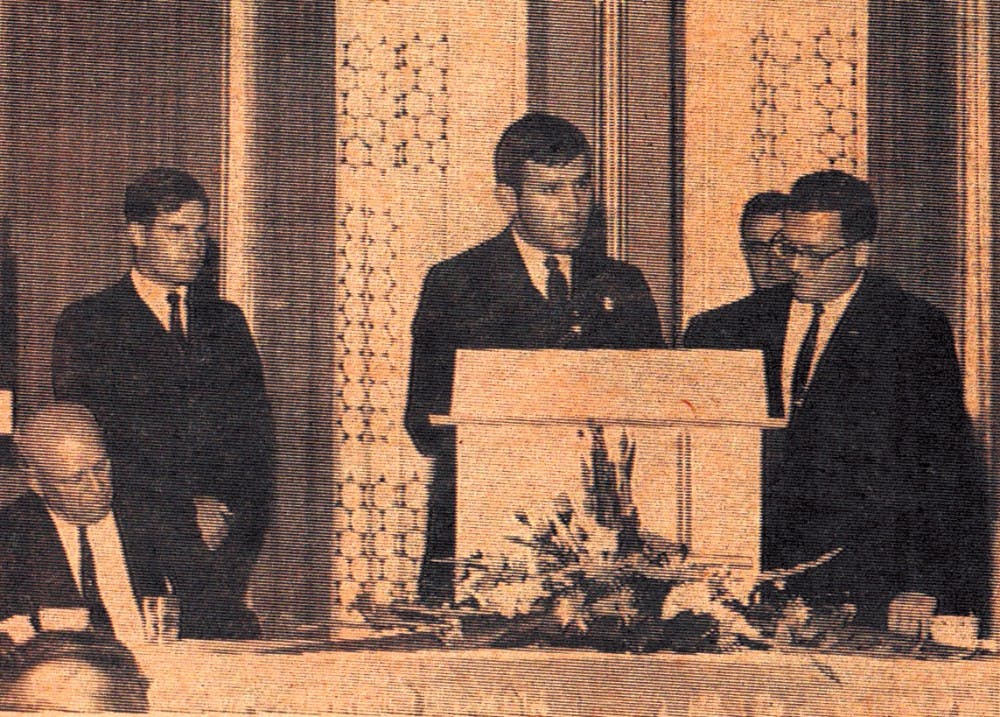Griffin leaves lasting legacy at CMU

Senator Robert Griffin visits the campus of Central Michigan University September 29, 1966. Griffin, who died April 17, leaves behind a lasting legacy at CMU.
Robert Griffin, a distinguished former senator and Central Michigan University class of 1947 alumnus, leaves behind a legacy of political advocacy and a foundation of educating students on political issues.
Griffin, 91, died April 17 at his home in Traverse City. He was one of the most powerful political figures of the 1970s, said political science faculty Jim Hill. Hill said Griffin was a a "behind the scenes" contributor who preferred working over being in the spotlight.
Hill worked for Griffin when he was a senator in the 1970s, first as an intern and then as a legislative assistant.
"I would work 18 hours a day, seven days a week," Hill said. "But I loved it. He had high standards for everyone, but he held himself to those standards too."
Griffin was described as a "perfectionist" who wanted to be "respected and trusted," Hill said.
Griffin is noted for advising Nixon to resign in 1974 after the Watergate scandal. He approached Nixon before his notorious televised confession and convinced him as Republican minority whip to resign.
"He was worried that Nixon would break into tears on live television," Hill said.
Griffin served 22 years in Congress. After a decade in the U.S. House of Representatives, he was appointed to the Senate in 1966 following the death of Senator Patrick McNamara. He was elected later the same year and re-elected in 1972, serving through 1978. He was the Republican minority whip from 1969-77.
Hill continued to work for Griffin until Griffin opted not to run for re-election in 1978. Hill then began working for Michigan representative Philip Ruppe. When Griffin changed his mind and it became clear that Ruppe and Griffin could both be in contention, Hill chose to go to Harvard instead of competing against his boss and mentor.
In 1959, Griffin was a driving force in the passing of the bi-partisan Labor Management Reporting and Disclosure "Landrum-Griffin Act." This addressed union corruption in the 1950's.
He was part of the effort to filibuster Abe Fortas' nomination for Chief Justice under Johnson in 1968 for Fortas' alleged "cronyism."
At CMU, he donated his U.S. Congressional papers to Clarke Historical Library after he left the Senate. He recently lifted all restrictions on public review of the collection.
The Griffin Endowed Chair leads the university's efforts to elevate political awareness and activity among students, faculty and citizens. The Griffin Endowed Chair also organizes two policy forums each year that address social, political economic, environmental and other current and important issues.
Griffin was honored at the last panel of the semester by various members of the CMU community. Dean of The College of Humanities and Social and Behavioral Science Pam Gates read a statement from "the president and the community."
"He was a champion of integrity and the political process, always honoring his word and his commitments in working with elected officials and constituents across the political spectrum," Gates said. "Griffin made his mark during a difficult time in American history."
In place of flowers, the Griffin family is asking that donations be made to the Griffin Endowed Chair in American Government in the Department of Political Science and Public Administration.



